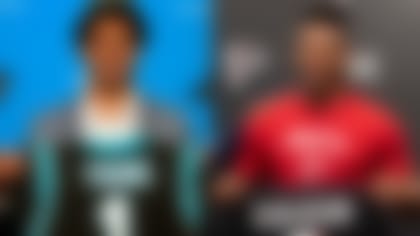Why provide instant grades on the selections of prospects who have yet to take an NFL snap? Well, you're reading this, aren't you? Considering the makeup of every roster and the factors surrounding each pick, Gennaro Filice and Nick Shook attempt a division-by-division assessment of the 2024 NFL Draft. Keep in mind that these grades are based on draft hauls alone -- picks traded for veteran players were not taken into account. Below is Nick's AFC South report card.
Round 1: Laiatu Latu, DE, UCLA (No. 15 overall)
Round 2: Adonai Mitchell, WR, Texas (52)
Round 3: Matt Goncalves, OT, Pitt (79)
Round 4: Tanor Bortolini, C, Wisconsin (117)
Round 5: Anthony Gould, WR, Oregon State (142) | Jaylon Carlies, LB, Missouri (151) | Jaylin Simpson, DB, Auburn (164)
Round 6: Marshall DB Micah Abraham, DB, Marshall (201)
Round 7: Oklahoma DT Jonah Laulu, DT, Oklahoma (234)
I was surprised to see Indianapolis end the defensive player drought at No. 15 when they chose Laiatu Latu, not because he wasn’t deserving of such a selection, but because I thought they might look elsewhere. Instead, the Colts took an edge rusher who was among the best in the class and will slide him into a group that suddenly looks more powerful than simply being known as DeForest Buckner and Friends. Colts general manager Chris Ballard pushed back against reports of character concerns regarding Adonai Mitchell mere hours after selecting him, and honestly, I agree: Mitchell’s talent and potential was worth the supposed risk of choosing him in the middle of the second round. Plus, the Colts added a running mate for Michael Pittman Jr. for a second straight year, then doubled down by adding another in Anthony Gould -- fully stocking up for Year 2 of the Anthony Richardson experience. I loved the choices of Matt Goncalves and Tanor Bortolini for a team that has needed reinforcements along the offensive line, especially with a couple of starters playing on expiring deals in 2024. I have high hopes for Bortolini, who impressed me at the NFL Scouting Combine and was a fantastic value pick in the fourth round -- especially if Indianapolis needs to replace Ryan Kelly a year from now. In total, Ballard spent his nine picks as if he was grocery shopping for months, adding a large volume of supplies to a cabinet that didn’t need a ton of ready-made meals. I would’ve liked a backup running back for Jonathan Taylor, though. We’ll see how it pans out in the years ahead.
Round 1: Brian Thomas Jr., WR, LSU (No. 23 overall)
Round 2: Maason Smith, DT, LSU (48)
Round 3: Jarrian Jones, DB, Florida State (96)
Round 4: Javon Foster, OT, Missouri (114) | Jordan Jefferson, NT, LSU (116)
Round 5: Deantre Prince, DB, Mississippi (153) | Keilan Robinson, RB, Texas (167)
Round 6: Cam Little, K, Arkansas (212)
Round 7: Myles Cole, DE, Texas Tech (236)
The Jaguars nailed their first-round pick, drafting a replacement for the departed Calvin Ridley after trading down. It’s truly a luxury (and a bit of savvy positional navigation) to be able to snag your ideal fit in the starting lineup while also adding future picks. It’s also nice to bolster your defensive line after spending big money on trusted starter Josh Allen, which is exactly what GM Trent Baalke did with his selections of Maason Smith and Jordan Jefferson, his second and third LSU products taken in this draft. Jarrian Jones will fill a similar role in the secondary as a rotational depth defender, while Javon Foster can get his feet wet before potentially being asked to man a starting spot in the future. I’m interested to see if Keilan Robinson can push D’Ernest Johnson and Tank Bigsby for a roster spot this summer; if he cracks the final 53, that could prove to be a wisely spent fifth-round pick. Baalke also set up a fun kicker battle for training camp, pitting Cam Little against veteran Riley Patterson, who returned to Jacksonville this offseason after spending 2023 with both Cleveland and Detroit.
Round 2: Kamari Lassiter, DB, Georgia (No. 42 overall) | Blake Fisher, OT, Notre Dame (59)
Round 3: Calen Bullock, DB, USC (78)
Round 4: Cade Stover, TE, Ohio State (123)
Round 6: Jamal Hill, LB, Oregon (188) | Jawhar Jordan, RB, Louisville (205)
Round 7: Solomon Byrd, DE, USC (238) | Marcus Harris, DT, Auburn (247) | LaDarius Henderson, OG, Michigan (249)
Trading out of the first round might seem like a downgrade, but it wasn’t for the Texans, who added a future second-round pick in their deal with Minnesota before drafting Kamari Lassiter to bolster their secondary. Blake Fisher could fit in opposite Laremy Tunsil -- time will tell, but on paper, it makes sense -- but the real gem of this class to me is Cade Stover. He was likely drafted in the appropriate range, and he should hit the ground running with his former Ohio State teammate, 2023 Offensive Rookie of the Year C.J. Stroud, as part of an offense featuring two very capable tight ends. Calen Bullock will likely see time as a rotational defensive back, while the sixth- and seventh-round picks will be expected to battle for roster spots. The Texans have transformed themselves into legitimate contenders quickly, so much that they could afford to trade away a first-round pick.
Round 1: Alabama OT JC Latham (No. 7 overall)
Round 2: Texas DT T'Vondre Sweat (38)
Round 4: North Carolina LB Cedric Gray (106)
Round 5: Louisville DB Jarvis Brownlee Jr. (146)
Round 6: Tulane WR Jha'Quan Jackson (182)
Round 7: Miami LB James Williams (242) | Michigan LB Jaylen Harrell (252)
Tennessee needed a left tackle and didn’t run from that reality, spending its top selection on JC Latham to fill out a group that has welcomed two linemen as first-round picks in consecutive years. The focus on the trenches didn’t end there, either, with GM Ran Carthon adding the beefy T’Vondre Sweat to plug gaps alongside Jeffery Simmons. Cedric Gray should compete (and possibly win) a job in Tennessee’s revamped linebacking corps, which already welcomed a new addition in Kenneth Murray. Carthon failed to add a tight end but did choose Jha’Quan Jackson, who is a long-term play at the receiver position, at least for now, and could offer immediate contributions as a returner. I’m excited to see if Jarvis Brownlee Jr. can fight his way onto the field early in 2024, which would strengthen a secondary that should be better following the acquisition of L’Jarius Sneed.















